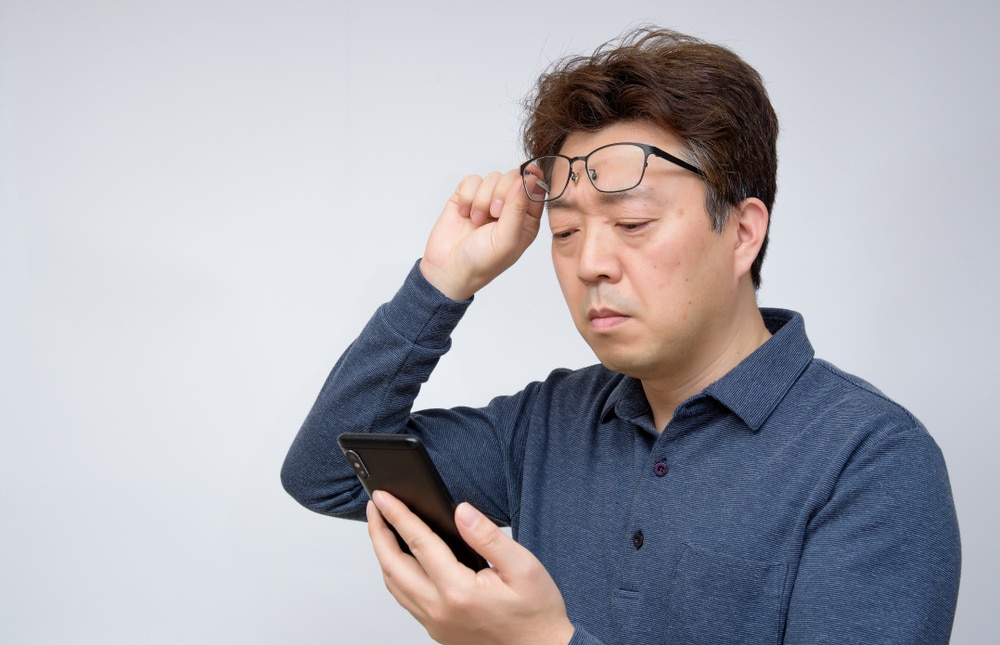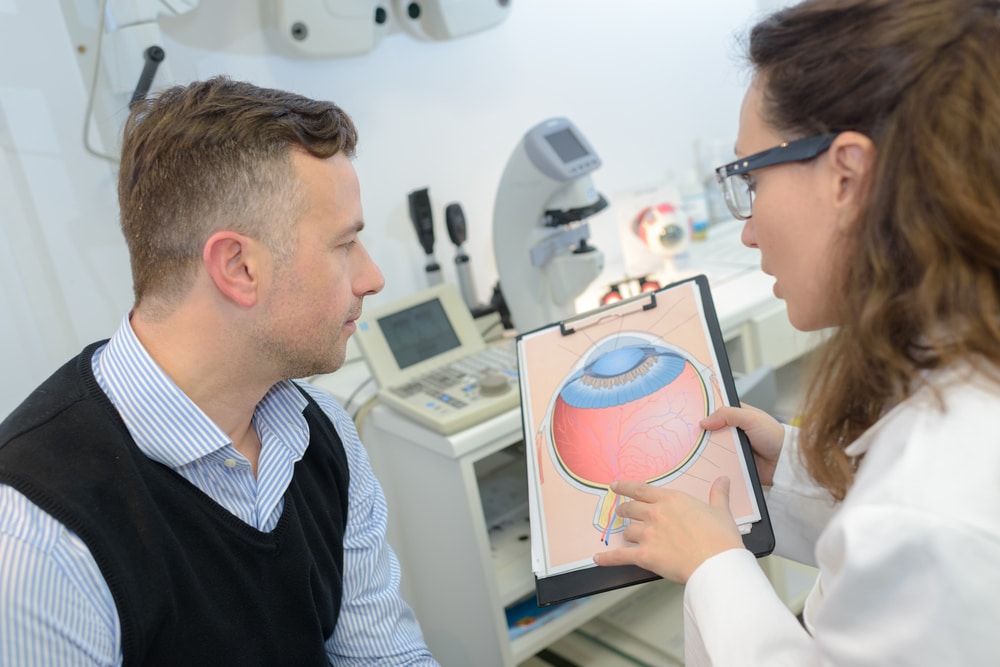Medically Reviewed by:
Presbyopia Treatment Options in Houston
With today’s range of presbyopia treatment options, reading glasses no longer have to be your reality. From multifocal contact lenses to presbyopia surgery, such as monovision LASIK, you are no longer limited to the options your grandparents had.
Eye Center of Texas understands the latest vision enhancement technology and strives to give patients the best outcome possible. Let us assess your vision and give you the facts and recommendations you need to make the best decision for your future.
What is presbyopia?
Presbyopia, also known as “near vision,” is caused by the lenses in your eyes becoming less flexible, which makes it hard for them to focus on up-close objects.
Even if you haven’t experienced presbyopia yourself, you’ve likely seen people “convey” the condition by holding books or newspapers far away from their faces in order to read them.
Presbyopia affects men and women at nearly the same rates. It typically onsets in your early to mid-40s and worsens until around age 65.
Knowing age is what causes presbyopia and not genetics means everyone is in the same boat; most people experience presbyopia to some extent later in life.
Do I have presbyopia?
Since it’s easy to confuse presbyopia with other common vision problems, let’s take a moment to break these issues down and differentiate between them.
- Myopia/nearsightedness: When you can see objects up close, but things far away are blurry.
- Hyperopia/farsightedness: When you can see objects far away but things up close are blurry.
- Presbyopia / near vision: When you gradually lose your ability to see up close due to age. In other words, presbyopia is age-related farsightedness.
Your surgical presbyopia treatment options
Presbyopia is not reversible, but if you want to live a life without glasses, correcting presbyopia is possible. If you’re wondering, If you wear bifocals, can you get LASIK or LASIK-like treatments? the answer is often yes.
Refractive lens exchange
Refractive lens exchange is a type of presbyopia surgery that involves replacing the lenses in your eyes with an Intraocular presbyopia lens. The procedure is similar to cataract surgery but, in this instance, the natural lens being replaced has not yet become clouded by a cataract.
Finding the right type of presbyopia lens is the most challenging part of this presbyopia treatment option, so it is critical to work with an experienced optometrist to discuss what type of lens is best for you. Options include multifocal contact lenses, monofocal lenses, and more.
Monovision LASIK
Also called blended vision LASIK, Monovision LASIK is a presbyopia treatment similar to typical laser eye surgery. The biggest difference is that Monovision LASIK does not fully correct both eyes. Many people who wear bifocals choose to get this type of LASIK to improve their vision and reduce the hassle of wearing frames or contacts.
During the procedure, one eye (typically your dominant eye) is corrected while the other is made partially nearsighted. This mimics the effects of bifocals and allows your eyes to work together to see objects both near and far.
Get Presbyopia Treatment at Eye Center of Texas
Eye Center of Texas has helped tens of thousands of patients like you get the vision you deserve. Our team has performed presbyopia surgery in Houston for many patients to restore their near vision and is happy to discuss this option in more detail during an office visit.
To discover which presbyopia treatment option is right for you, call us at 713-797-1010 or request an appointment online at any of our many Houston-area locations.
More Helpful Articles by Eye Center of Texas:
Related Articles
Medically Reviewed by:
Can Presbyopia be Corrected with LASIK?
Can presbyopia be corrected LASIK? While presbyopia cannot be corrected with the standard LASIK procedure specifically, there is a type of laser surgery called Monovision LASIK that can provide relief from presbyopia (if farsightedness is your only issue). Learn more about presbyopia surgery in Houston and what treatment options are best for you.
Prefer to speak with one of Houston’s best optometrists directly rather than reading articles? Contact Eye Center of Texas! We are happy to explain treatment options and answer any questions you may have, such as: If you wear bifocals, can you get LASIK?
What is presbyopia?
If you’re over 40 years old and find it difficult to see up close without squinting or creating distance with an outstretched arm, then you likely have presbyopia. Don’t worry, it’s one of the most common vision problems.
Almost everyone experiences presbyopia to some extent later in life. What causes presbyopia? Age! Your eyes lose their flexibility to easily adjust to different distances.
Understanding Monovision LASIK
Monovision LASIK, also known as blended vision LASIK, is a refractive surgery in which one eye (typically your dominant eye) is corrected while the other eye is made partially nearsighted, also known as blended vision LASIK. Your brain connects the dots to provide you with a clear image, helping to improve near vision and distance vision.
As your eyes continue to age, the cornea may require further reshaping with other forms of LASIK surgery to maintain perfect vision. Glasses or contacts can also be added down the road if necessary.
Should I get Monovision LASIK for presbyopia?
Once people know the answer to the question Can presbyopia be corrected LASIK? the follow-up question tends to be: am I a candidate for Monovision LASIK?
So long as your eyes are healthy in general (no chronic conditions) and your corneas have the minimum thickness necessary for laser eye surgery, you are likely a good candidate health-wise for LASIK. Even if you develop near vision after a previous LASIK procedure, laser treatment for presbyopia after LASIK may still be possible.
That said, many people benefit from trying Monovision contact lenses before opting to get Monovision LASIK. Doing so can help you see whether you can adjust to Monovision successfully, or if you find it uncomfortable.
It’s important to keep in mind that most presbyopia treatments do involve some form of compromise.
- If you choose monovision, although your vision may work well for almost all purposes, it might take some time to adjust, and some people never feel entirely comfortable with the change.
- If you have both eyes corrected for either nearsightedness or farsightedness, you will need glasses or contact lenses to compensate for whichever distance you did not choose.
If these options don’t sound attractive, that’s OK. Sometimes reading glasses or contact lenses are the best choice to correct presbyopia and other times surgery makes the most sense.
Additional types of presbyopia treatments
Refractive Lens Exchange
Refractive lens exchange (RLE) is a procedure in which a doctor replaces your eye’s natural lens with a synthetic, intraocular lens rather than reshaping the cornea. RLE is a more permanent solution than Monovision LASIK and provides near vision and distant vision simultaneously in both eyes.
Monovision LASIK is considered less invasive than RLE, but both procedures have high satisfaction levels. An in-depth presbyopia surgery in Houston consultation can help determine which style you may be a better candidate for, which presbyopia lens is right for you (if applicable), and provide more info about the results you can expect.
Monovision LASIK at Eye Center of Texas
So, can presbyopia be corrected with LASIK? Monovision LASIK can provide surgical correction for presbyopia, but it’s best to consult with a professional to see whether this option is right for you.
At Eye Center of Texas, it’s our goal to improve the quality of your life and give you the best vision possible. The desire with Monovision LASIK is that you will have perfect vision and never need to wear glasses again following surgery.
To discover which presbyopia treatment option is right for you, call us at 713-797-1010 or schedule an appointment online at any of our many Houston-area locations.
More Helpful Articles by Eye Center of Texas:
Related Articles
Financing Options Available
Apply today to find a financing option that meets your needs.
Our Locations
Houston/Bellaire
6565 W. Loop S., Suite 650Bellaire, TX 77401
Medical Office:
713-797-1010
Medical Fax:
713-357-7276
LASIK/Near Vision:
Office: 713-395-1515
Fax: 713-357-7278
Pasadena
4415 Crenshaw RoadPasadena, TX 77504
Medical Office:
281-977-8800
Medical Fax:
281-977-8877
Sugar Land
15200 S.W. Freeway, Suite 130Sugar Land, TX 77478
Medical Office:
281-277-1010
Medical Fax:
281-277-4504
Clear Lake
455 E. Medical Center Blvd., Suite 110Webster, TX 77598
Medical Office:
281-332-1397
Medical Fax:
281-282-9152
Katy
Greenhouse Medical Plaza2051 Greenhouse Road, Suite 110
Houston, TX 77084
Medical Office:
346-547-7070
Medical Fax:
281-214-2971
The Woodlands/Conroe
100 Medical Center Blvd., Suite 118Conroe, TX 77304
Medical Office:
936-647-1610
Medical Fax:
936-647-1620

